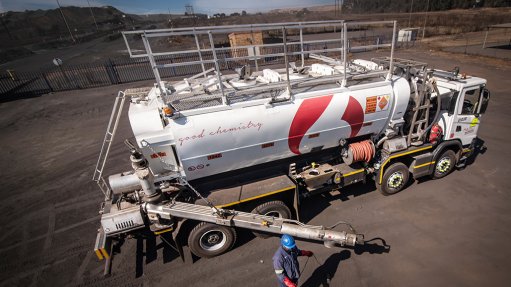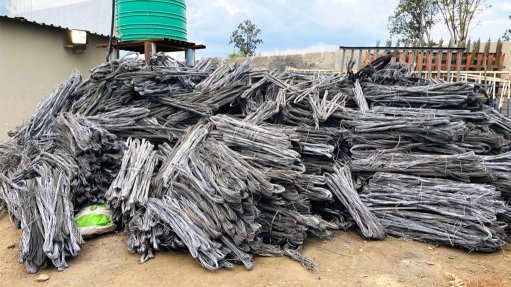Supplier claims world first in locomotive steering, unlimited growth potential
Johannesburg-based loco- motive solutions provider DCD Rolling Stock believes it has unlimited growth potential owing to its patented Jika passive hydraulic steering (PHS) system for bogies, which is an industry first due for commercial release.
DCD Rolling Stock technical manager Daryl Leggitt says this is the first time that hydraulics have been applied for self-steering to locomotive bogies in South Africa.
Adaptability is the key to DCD Rolling Stock’s development of the PHS system, which the company says will help make railways more competitive globally.
It is anticipated that the system will increase the life span of the locomotive wheel by three times while reducing track maintenance by 60% and energy consumption by 3%.
“Looking to the future, it will be possible to fit these systems to bogies for new locomotives and retrofit them to existing locomotives too,” says DCD Rolling Stock product engineer and Jika PHS inventor Pat Smit, noting that Jika was officially launched in October at the TransAfrica Transport, Infrastructure and Investment Expo, which was held at the Nasrec Expo Centre.
This latest technological advance in hydraulic steering systems for locomotives, which is officially being trialled in full rail service, serves as a more efficient, reliable, maintainable and cost-effective alternative to the current mechanical linkage system for locomotives.
Mechanical linkage systems in locomotives have proved to have low efficiency because of fast degredation over the service cycle that is caused by wear, elasticity of components and free-play. “Bearing this in mind, DCD Rolling Stock began research on a more user-friendly and cost-effective solution for locomotive bogie steering and maintenance in 2009,” Smit points out.
He says by using a hydraulic system, traditional links and levers, used for steering, can be dispensed with. “The steering system is simplified and deficiencies like leakages are visible, making the steering subsystem easier to maintain. A major challenge that the Jika PHS overcomes is the lack of space within and distance between the wheel sets of a bogie. This is particularly relevant in the case of three-axle bogies, which comprise a central wheel set with a traction motor and braking system.”
DCD Rolling Stock officially filed the patent for the Jika PHS in May. This patent extends to countries such as Australia, Austria, Brazil, Canada, China, France, Germany, India, Russia, South Africa, Sweden, Switzerland, Ukraine and the US.
With this in mind, Smit is confident that the Jika PHS system will be a game-changer in the local and international railway sector.
He says the Jika PHS has been specifically designed for commercial freight lines, where frequent and small radius curves are common.
“The replacement of train wheels is a regular and expensive process, apart from the cost of wheels it also involves infrastructural costs, locomotive downtime and work hours. The use of the Jika PHS will also permit the use of three-axle bogie locomotives (Co-Co), as opposed to the two-axle (Bo-Bo) bogie models giving lower wheel/rail lateral forces and possibly lower axle loads, enabling it to be used on lighter rail sections.
This system has benefits for low and high axle loads.
According to Smit, another major benefit of the Jika PHS is that it provides off-flange curving and, thus, reduces flange wear eightfold because it decreases the angle of attack between wheel and rail. This design benefit will, ultimately, extend the life span of the average locomotive wheel by up to three times, thereby ensuring greater locomotive availability, operational efficiency and substantial savings on maintenance.
In addition to reducing wear on the rails on curves and loco- motive wheels, consequently reducing energy consumption, the reduction of locomotive tracking forces decreases the track shift and rail spread.
“Secondary benefits of the Jika PHS also include a more universal locomotive. Tertiary benefits include a smoother and almost silent ride, as well as less pollution since self-steering does not require rail or wheel lubrication systems,” explains Smit.
Proven Performance
DCD Rolling Stock has been undertaking concept testing on the Jika PHS product since 2010, and is currently in discussions with various rail operators worldwide to undertake in-service testing in other environments to validate its initial data.
Using instrumented wheel sets that measure and record the force imparted by locomotives on railway lines, DCD Rolling Stock engineers discovered that when negotiating curves, the Jika PHS reduced lateral forces by a factor of five on long wheelbase bogies.
“During one test, official data revealed that a 4 t existing lateral force on the rail was reduced to just 800 kg,” relays Smit.
Following these successful tests, the Jika PHS bogie was retrofitted onto bogies on three locomotives in August and will operate in full service. The Jika PHS bogie is being compared with six similar locomotives fitted with conventional bogies over a six-month trial, which started in September 2013.
Three locomotives have been fitted with Jika. The first two have already done over 25 round trips of about 25 000 km each.
“This real-life application testing process is being undertaken to focus strongly on wheel-tread and flange wear reduction. Aspects such as improved serviceability, reliability and maintainability are also being studied, as well as noise levels and the lateral wheel-to-rail forces,” says Leggitt.
“In the past, a system was used to measure and match wheels in the sets on a bogie. This was replaced by under floor lathes, which allow wheel treads to be cut, without the locomotive wheel sets having to be removed,” says Smit.
Although this decreases locomotive downtime and labour, the life span of the wheels are substantially reduced as a result of sacrificial machining, which is almost always as a result of flange wear. The use of the Jika PHS on bogies will reduce the need for excessive cuts on the wheel treads to restore the profiles.
Despite the significant progress made on the development of the Jika PHS, Leggitt admits that several of the additional in-depth tests must still be undertaken by DCD Rolling Stock. He also reveals that the company has been working in conjunction with a leading university to design a hydraulic cylinder unit that is capable of maintenance-free operation for six years.
“The hydraulic cylinder will also feature a rugged design, as it will be exposed to numerous hazards, such as high acceleration, possible pressure spikes, heat, vibration and flying stones from the track,” says Leggitt.
Another challenge facing DCD Rolling Stock in unfavourable economic times is the implementation of the Jika PHS system, which will involve some additional upfront costs.
Leggitt does, however, stress that the overall life cycle cost of bogies fitted with the Jika PHS system will be considerably lower than conventional bogies in the long term. “The initial cost increase will be minimal and, taking into account that the Jika PHS is anticipated to extend wheel life by up to three times, it should pay for itself in a matter of months,” he says.
Since 1944, DCD Rolling Stock has produced over 130 000 wagons, 1 000 surface and 4 000 underground locomotives and over 278 000 bogies. In addition to revolutionising the global rail- way industry through the Jika PHS, the company will also create sustainable employment opportunities by aiming to source 90% of its materials from South African suppliers.
“DCD Rolling Stock has established itself as a competitive supplier of locomotives, wagons, bogies and related equip- ment to local and inter- national railways, mining and industrial operations,” says Smit.
Article Enquiry
Email Article
Save Article
Feedback
To advertise email advertising@creamermedia.co.za or click here
Press Office
Announcements
What's On
Subscribe to improve your user experience...
Option 1 (equivalent of R125 a month):
Receive a weekly copy of Creamer Media's Engineering News & Mining Weekly magazine
(print copy for those in South Africa and e-magazine for those outside of South Africa)
Receive daily email newsletters
Access to full search results
Access archive of magazine back copies
Access to Projects in Progress
Access to ONE Research Report of your choice in PDF format
Option 2 (equivalent of R375 a month):
All benefits from Option 1
PLUS
Access to Creamer Media's Research Channel Africa for ALL Research Reports, in PDF format, on various industrial and mining sectors
including Electricity; Water; Energy Transition; Hydrogen; Roads, Rail and Ports; Coal; Gold; Platinum; Battery Metals; etc.
Already a subscriber?
Forgotten your password?
Receive weekly copy of Creamer Media's Engineering News & Mining Weekly magazine (print copy for those in South Africa and e-magazine for those outside of South Africa)
➕
Recieve daily email newsletters
➕
Access to full search results
➕
Access archive of magazine back copies
➕
Access to Projects in Progress
➕
Access to ONE Research Report of your choice in PDF format
RESEARCH CHANNEL AFRICA
R4500 (equivalent of R375 a month)
SUBSCRIBEAll benefits from Option 1
➕
Access to Creamer Media's Research Channel Africa for ALL Research Reports on various industrial and mining sectors, in PDF format, including on:
Electricity
➕
Water
➕
Energy Transition
➕
Hydrogen
➕
Roads, Rail and Ports
➕
Coal
➕
Gold
➕
Platinum
➕
Battery Metals
➕
etc.
Receive all benefits from Option 1 or Option 2 delivered to numerous people at your company
➕
Multiple User names and Passwords for simultaneous log-ins
➕
Intranet integration access to all in your organisation


















